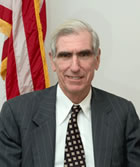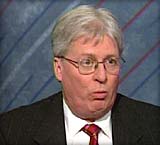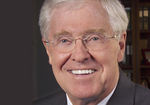NFIB's Legal Arm
The National Federation of Independent Business (NFIB) is a lobbying group that calls itself "the voice of small business."[1] However, the group has been shown to lobby on issues that favor large corporate interests and run counter to the interests of small businesses.[2][3] NFIB is best known for its legal attack on the Affordable Care Act ("Obamacare") and for spearheading the opposition to President Clinton's health care reform package in 1993.
NFIB has a legal arm called the NFIB Small Business Legal Center (SBLC). The SBLC spearheads the NFIB's legal assault on the Affordable Care Act ("Obamacare"). It is one of its three 501(c)(3) foundation arms.[4] Formed in January 1994 as the NFIB Legal Foundation, the litigation arm took years to get off the ground, possibly because of funding and turf issues. (The U.S. Chamber of Commerce has a well-funded litigation arm, the Institute for Legal Reform, which had a budget of $42.5 million in 2010; and the Washington Legal Foundation, with a 2009 budget of $2.7 million, has played a leading role in antiregulatory strategic litigation for years).[5]
When it finally was launched in 2000 with an initial budget of $300,000, the NFIB Legal Foundation was able to attract two legal heavy-hitters to its advisory board: former Commodity Futures Trading Commission chair Wendy Lee Gramm (who founded the Mercatus Center at George Mason University, funded by the Koch brothers); and C. Boyden Gray, the former White House Counselor for the George H.W. Bush administration and an important architect of the right wing's principal legal networking organization, the Federalist Society.[6] C. Boyden Gray remains on the board of directors of the Federalist Society.
NFIB Legal Foundation's first executive director was Thomas M. Sullivan, who had been NFIB's regulatory counsel since 1998. Three years later Sullivan was appointed by President George W. Bush to serve as chief counsel for advocacy at the Small Business Administration.[7] After assuming his new post, he gave an NFIB gathering this description of the nations capital: "[I]n Washington, it's all about power brokers, lobbyists and trade associations and members of Congress."[8]
Click here for the SourceWatch main page on the National Federation of Independent Business (NFIB).
Contents
NFIB Battles Legal Protections for Workers, Women, and the Environment
The first president of the NFIB Legal Foundation, Jack Faris, laid out the group's key initial targets -- not concerns about anti-trust issues and big business concentration, NFIB's original focus, but "inequities in the Americans with Disabilities Act regulations, Environmental Protection Agency clean air rules, and Occupational Safety and Health Administration requirements."[9] Its first case in 2000 was an effort to block a Clean Water Act rule issued by the Army Corps of Engineers.[10]
Later in 2000 the NFIB Legal Foundation joined a lawsuit challenging a regulation issued by OSHA designed to reduce repetitive-motion stress injuries.[11] The case became moot in 2001 when Congress passed legislation repealing the OSHA ergonomics rule. The NFIB Legal Foundation claimed credit for having forced the repeal.[12]
- Sexual Harassment: In 2006, the NFIB Legal Foundation filed an amicus brief in the Supreme Court challenging a federal appeals court's ruling on what constitutes actionable retaliation in a sexual harassment case under Title VII of the Civil Rights Act. The brief claimed that the court's ruling upholding the retaliation claim jeopardized legitimate employer practices.[13] NFIB Legal Foundation filed the amicus brief jointly with Proskauer Rose.
- Lily Ledbetter: The following year the NFIB Legal Foundation applauded the Supreme Court's decision denying Lily Ledbetter the right to sue Goodyear for pay discrimination because her case was not filed within 180 days after the first discriminatory paycheck, even though she had no way of knowing then that she was paid less than her male counterparts.[14]
- Americans with Disabilities Act: In 2007 the NFIB Legal Foundation's senior executive counsel, Elizabeth Gaudio denounced what she called "predatory plaintiffs using the [Americans with Disabilities Act] to extort small businesses in 'drive-by' lawsuits."[15] Gaudio and NFIB Legal Foundation executive director Karen Harned also wrote an article for the journal of the Federalist Society's practice group offering court-based strategies for restricting litigation under the ADA.[16]
- Wal-Mart Law: Gaudio also praised a federal court's overturning of Maryland's so-called Wal-Mart Law, which sought to make large employers in the state pay a fair share of their low-wage workers' state-funded medical costs.[17]
- Right to Work: That year the NFIB Legal Foundation also submitted a friend-of-the-court brief in a major Washington state case filed by the National Right to Work Foundation challenging the ability of unions to use non-member dues for political purposes without first obtaining their consent. The amicus brief was prepared for NFIBLF by James Bopp, Jr., who two months later filed a landmark case for Citizens United that overturned a century of precedent in election finance law.[18]
Leadership
In 2007, the NFIB Legal Foundation changed its name to the NFIB Small Business Legal Center (SBLC). Its executive director since April 2002 has been Karen R. Harned, who previously was an attorney for Olsson Frank Weeda, where she lobbied on food and drug issues. Senior executive counsel is Beth Milito, a former Veterans Administration attorney. In 2009 Milito claimed that legislation overturning the Lily Ledbetter Supreme Court decision would place "more burdens on employers in terms of in-house costs, keeping more records and outside legal fees. It's going to be costly for businesses."[19]
Executive Director Harned also serves as advisor on small business issues to the Litigation Practice Group of the Federalist Society. The practice group's tort and liabilities subcommittee's co-chair, Mark A. Behrens of Shook, Hardy and Bacon, sits on the advisory board of NFIB Small Business Legal Center. The group's immediate past chair is Marsha Rabiteau, associate general counsel for legal reform at Koch Industries, Inc.[20]
Funding
From 2003-2004, NFIB's Small Business Legal Center received $88,000 in funding from the Koch-controlled Claude R. Lambe Foundation.[21] SBLC also received $100,000 from the Lynde and Harry Bradley Foundation, the leading foundation funder of the right-wing think tank infrastructure. The donation came in the run-up to the fall 2010 congressional elections and just as SBLC's healthcare litigation was ramping up.[22]
The budget for SBLC has grown from $200,000 in 2000[23] to over $2.2 million in 2010.[24] It more than doubled between 2009, when it was $967,803,[25] and 2010, when it surged to $2,202,992.[24] A major increase in the group's expenditures consisted of legal fees of $1,073,242 paid to Baker Hostetler in 2010;[26] that firm represented NFIB and 26 states in their federal lawsuit challenging the constitutionality of the Affordable Care Act.
On its 2010 tax return, SBLC reported receiving $282,548 from a related organization (presumably NFIB Inc.) and $1,875,892 in contributions, gifts and grants.[27] The previous year's grants total was $559,573.[25] The additional amount in 2010 more than covers SBLC's legal fees that year to Baker Hostetler. It is not clear who provided the extra funding to support the group's legal expenses in its challenge to the healthcare law up through the Appeals court and Supreme Court, and to pay for the legal work being done by Jones Day attorneys Michael A. Carvin and Gregory Katsas as they prepared for and argued the case before the Supreme Court in March 2012.
President Dan Danner told the Wall Street Journal that the healthcare litigation cost NFIB $2.9 million in 2010 alone, with about $1.6 million coming from "'contributed services,' referring to an agreement with an outside law firm to handle the case."[28]
As a 501(c)(3), SBLC is not required to disclose the source of its funding. The group has so far refused to disclose the source(s) of the additional funding for the healthcare litigation.
Questions have also arisen about the propriety of SBLC's paying the lion's share for litigation involving 26 states. "My concern is if it's a lawsuit on behalf of the people of Florida, then I would believe it should be the people of Florida footing the bill," state Rep. Mark Pafford, D-West Palm Beach, told the Palm Beach Post. "When you have an outside party paying, then every aspect of the AG's office might be up for sale. This type of thing raises all kind of red flags."
"I'm not sure most voters understand that a lawsuit by their states is being funded by an ideological organization with an issue ax to grind," Ethan Rome, executive director of Health Care for America Now, told the newspaper. "In this case there appears to a serious perversion of the process."[29]
The Advisory Board
SBLC has a 14-member advisory board[30] consisting of some of the nation's top corporate-side experts in workplace litigation and opponents of regulation. NFIB's chief lobbyist Susan Eckerly and Nelson Mullins attorney Thomas Sullivan are also on the advisory board. Selected members include:
Melissa A. Bailey: Bailey is the managing shareholder of the DC office of Ogletree Deakins, one of the most prominent anti-union law firms in the country. She boasts of her extensive success in turning back OSHA lawsuits for corporate clients.[31]
Her colleague, Harold Coxson, also based in DC, chairs Ogletree's government relations practice and is executive director of the Tuesday Group, an "informal organization" of 35 national trade associations "involved in workplace issues."[32] He has lobbied on behalf of the Chamber of Commerce on the Employee Free Choice Act and on NLRB confirmations.[33]
Ogletree advertises its ability to help companies in "maintaining union free status," and boasts of its "extensive experience representing management in union representation campaigns." Most of its clients "go year after year without experiencing a union election." Ogletree says that its services extend "from union card signing activity and traditional union campaigns involving NLRB elections, to campaigns involving various levels of neutrality, to multistate and even global attacks." Their experience, they say, "has familiarized us with the broad spectrum of union organizing tactics."[34]
Maurice Baskin: Baskin is the chair of Venable's Labor and Employment Law Practice Group. He spearheaded a key 2002 Supreme Court case, BE&K v. NLRB, that reversed an NLRB ruling that a company had interfered with a union's organizing drive. Baskin has served on the U.S. Chamber of Commerce's labor relations committee, and represented the Associated Builders and Contractors (ABC) in employment-related matters.[35]
Mark A. Behrens: As noted above, Behrens, of Shook, Hardy and Bacon, co-chairs the tort and liabilities subcommittee of the Federalist Society's Litigation Practice Group, whose immediate past chair is Marsha Rabiteau, associate general counsel for legal reform at Koch Industries, Inc. Behrens is an advisor to the American Legislative Exchange Council's Civil Justice Task Force, and serves on the Washington Legal Foundation's Legal Policy Advisory Board.[36] Behrens authored an amicus brief on behalf of NFIB and other organizations in the Paz v. Brush Engineered Materials case, challenging medical monitoring for toxic substances in the workplace.[37]
Susan E. Dudley: A former head of the Regulatory Studies Program at George Mason University's Koch-funded Mercatus Center, Dudley now directs the George Washington University Regulatory Studies Center. Before going to GWU, she was appointed head of the Office of Information and Regulatory Affairs by President George W. Bush. According to the Los Angeles Times, Dudley was one of three people previously blocked by Congress from holding environment-related positions "because of their pro-industry views."[38]
Leonard Leo: Leo is head of the lawyers division and executive vice president of the Federalist Society, the right wing's principal legal networking organization. He played a key role in the George W. Bush administration in vetting nominations to the U.S. Supreme Court.
Tammy McCutchen: McCutchen, a shareholder at Littler Mendelson, was administrator of the wage and hour division at the U.S. Department of Labor, where she radically expanded the number of occupations and positions that were exempt from wage and hour rules and weakened overtime pay rules. McCutchen is the former chair and now a special adviser to the Federalist Society's Labor & Employment Practice Group (now chaired by Eugene Scalia, son of Supreme Court justice Antonin Scalia, member of the executive committee and chair of the labor employment group at Gibson, Dunn and Crutcher).[39]
Edwin Meese III: Meese, the former attorney general under President Reagan, has spent the past two decades as chair of the Center for Legal and Judicial Studies of the Heritage Foundation. The Heritage Foundation, which lined up with NFIB to fight the Clinton healthcare plan in the 1990's and is again fighting the Affordable Care Act,[40] has waged a sustained battle against guaranteed paid sick days, federal parental leave, federal employee pay levels and labor organizing rights.[41] Heritage's director of editorial services, James Weidman, is a former deputy director of regional media communications for NFIB.[42]
Howard M. Radzely: Radzely was Deputy Secretary of Labor from December 2007 to February 2009, and before that solicitor in the Labor Department, where he was supervised by Eugene Scalia. He is now at Morgan Lewis. The Government Accountability Project and Public Employees for Environmental Responsibility (PEER) opposed his nomination to be labor solicitor, citing his "hostility to whistleblowers" and "abdication of responsibility for labor law violations against state employees."[43]
Essential Resources
Related SourceWatch Articles
- National Federation of Independent Business
- NFIB's Right Wing Ties
- NFIB Opposition to Earned Sick Days
- American Legislative Exchange Council
- Lynde and Harry Bradley Foundation
- Donors Trust
PRWatch Articles on NFIB
- PRWatch, NFIB's "I Built My Business" Astroturf Bus Tour Gets Rolling in Wisconsin, Harriet Rowan, October 23, 2012.
- PRWatch, On NFIB Conference Call, Romney Urges Employers to Tell Employees How to Vote, Just Like the Kochs, Brendan Fischer, October 18, 2012.
- PRWatch, NPR, NBC Use One Guy for Small Biz Opposition to ACA and Fail to Disclose his NFIB Ties, Emily Osborne, July 6, 2012.
- PRWatch, Who is Bankrolling the Fight Against "Obamacare?", Brendan Fischer, June 27, 2012.
- PRWatch, Insurers are Recycling a Front Group to Cheat Us Out of Benefits, Wendell Potter, November 10, 2011.
NFIB in the News
- CNN, Koch Bros.-backed group gave millions to small business lobby, Chris Frates, November 21, 2013.
- Businessweek, How the Insurance Industry Funded Small Business's Anti-Obamacare Message, John Tozzi, May 14, 2013.
- Associated Press, Business Making an Anti-Regulation Pitch to Voters, Larry Margasak, September 18, 2012.
- Huffington Post, Who Really Represents the Interests of Small Biz?, Jared Bernstein, July 26, 2012.
- Mother Jones, Meet the Front Group Leading the Fight Against Taxing the Rich, Josh Harkinson, July 23, 2012.
- The Hill, Secrecy is Not a Small Business Value. Transparency Is, David Borris, July 19, 2012.
- The Hill, Big money behind misinformation on healthcare law, Frank Knapp, Jr., June 29, 2012.
- Huffington Post, NFIB, Plaintiff In Supreme Court Lawsuit Against Obamacare, Refuses To Disclose Donors, Greg Rosalsky, June 27, 2012.
- National Journal, The Secret Money Behind the Health Care Challenge, Elahe Izadi, June 26, 2012.
- Salon.com, The Group Trying to Kill Obamacare, Alex Seitz-Wald, June 25, 2012.
- Inc., Small Business Group Under Fire on Funding, John McDermott, June 25, 2012.
- Washington Post, Clash Over Financial Disclosure Escalates, Spilling into Presidential Race, Dan Eggen, June 23, 2012.
- Washington Post, Small Business Group’s Political Motives Come Under Question in Battle Against Health Care Law, J.D. Harrison, June 14, 2012.
- Wall Street Journal, Lawmakers Question Small-Business Group's Funding, Angus Loten, June 14, 2012.
- The Hill, House Liberals Want Group that Filed Suit Against Healthcare Law to Reveal Donors. Mike Lillis, June 13, 2012.
References
- ↑ NFIB, NFIB, organizational website, accessed September 20, 2012.
- ↑ Jeffrey H. Birnbaum, A Quiet Revolution in Business Lobbying, The Washington Post, February 5, 2005.
- ↑ American Sustainable Business Council, Main Street Alliance, and Small Business Majority, Opinion Survey: Small Business Owners’ Opinions on Regulations and Job Creation, February 1, 2012.
- ↑ NFIB Small Business Legal Center, Form 990 (Part 1 and Part 2), organizational IRS filing, 2010.
- ↑ U.S. Chamber of Commerce Institute for Legal Reform, 2010 IRS Form 990, p. 1; Washington Legal Foundation, 2009 IRS Form 990, p. 1.
- ↑ Louis Jacobson, "Small Business Group to Bring Lawsuits Against Agencies," Government Executive, March 17, 2000.
- ↑ Sullivan's law firm still has NFIB as a client and he is on the NFIB Small Business Legal Center's advisory board. He also recently registered as a lobbyist for his law firm for the U.S. Chamber of Commerce. Sullivan is now of counsel at Nelson Mullins and heads the Small Business Coalition for Regulatory Relief.
- ↑ David Milstead, "SBA Official Urges Contacts," Rocky Mountain News, June 4, 2003, available from Highbeam.com via subscription, accessed September 2012.
- ↑ Jack Faris, "Small Business Gets A Lawyer," Treasure Coast Business Journal, May 1, 2000, accessible by subscription via Nexis.com, accessed September 2012.
- ↑ "Senator Bond Applauds NFIB Legal Foundation's First Lawsuit," U.S. Newswire, June 29, 2000.
- ↑ Jonathan Riskind, "Brown to Fight Mexican Truck Ruling," Crain's Cleveland Business, December 11, 2000, accessible by subscription via Highbeam.com, accessed September 2012.
- ↑ NFIB, "NFIB v. OSHA-NFIB Forces Repeal of Costly Ergonomics Rule," organizational website, accessed September 2012.
- ↑ "Proskauer Rose Files Amicus Brief in Major Employment Discrimination Case Now before the U.S. Supreme Court," Business Wire, February 14, 2006.
- ↑ Miles Moore, "High Court Favors Goodyear in Pay Discrimination Suit," Tire Business, June 4, 2007, accessible by subscription via Highbeam.com, accessed September 2012.
- ↑ Elizabeth Gaudio, "ADA Tax Breaks Help Small Businesses Stay Accessible," Magic City Morning Star, May 24, 2007.
- ↑ Karen R. Harned and Elizabeth A. Gaudio, "The ADA Opening Doors for the Plaintiff's Bar: How Ambiguities in Title III Inhibit Access, Increase Litigation, and Hurt Business," Engage (Federalist Society), Volume 7, Issue 1, March 2006.
- ↑ NFIB, "Victory for Small Business: Court Rejects Maryland 'Wal-Mart' Law," organizational website, accessed September 2012.
- ↑ See NFIBLF's amicus brief in Davenport v. Washington Education Association, November 8, 2006. The American Legislative Exchange Council also submitted an amicus brief in the case. On Bopp see Stephanie Mencimer, "The Man Behind Citizens United Is Just Getting Started: Meet The Lawyer Who Could Turn Our Elections Upside Down," Mother Jones, May/June 2011.
- ↑ Eliot Caroom, "Ledbetter Law Will Increase Suits," Inc. magazine, February 23, 2009.
- ↑ Federalist Society, "Litigation Practice Group Executive Committee," Accessed March 19, 2012.
- ↑ Claude R. Lambe Foundation, IRS Forms 990 for 2003 and 2004.
- ↑ Lynde and Harry Bradley Foundation, IRS Form 990, 2010, pp. 72-73.
- ↑ NFIB Small Business Legal Center, Form 990, organizational IRS filing, 2000
- ↑ 24.0 24.1 NFIB Small Business Legal Center, Form 990, Part 1, organizational IRS filing, 2010, p 1
- ↑ 25.0 25.1 NFIB Small Business Legal Center, Form 990, organizational IRS filing, 2009
- ↑ NFIB Small Business Legal Center, 2010 IRS Form 990, part 2, p. 32.
- ↑ NFIB Small Business Legal Center, Form 990, Part 1, organizational IRS filing, 2010, p. 9.
- ↑ Sarah E. Needleman and Angus Loten, "A Small-Business Lobby's Million-Dollar Legal Assault," Wall Street Journal, March 27, 2012.
- ↑ Charles Elmore, "Lobbying Group Picks Up Costs Of Florida's Health-Care Legal Challenge," Palm Beach Post, February 19, 2011.
- ↑ NFIB Small Business Legal Center, "Small Business Advisory Board," accessed March 8, 2012.
- ↑ Ogletree Deakins, "Attorney Bio-Melissa A. Bailey," accessed March 13, 2012.
- ↑ Ogletree Deakins, "Attorney Bio--Harold P. Coxson, Jr.," accessed March 13, 2012.
- ↑ Congressional Lobbying Report, Ogletree Government Affairs, Inc., 2nd Quarter, 2010.
- ↑ Ogletree Deakins, Traditional Labor Relations Practice Group," brochure, accessed March 13, 2012.
- ↑ NFIB Small Business Legal Center, "Small Business Advisory Board," accessed March 8, 2012; Venable, "Maurice Baskin."
- ↑ Federalist Society, "Litigation Practice Group Executive Committee," Accessed March 19, 2012; Shook, Hardy and Bacon, "Mark A. Behrens," accessed March 13, 2012.
- ↑ Behrens discussed the case in an article in a Federalist Society publication: Mark A. Behrens, "Fifth Consecutive State High Court Rejects Medical Monitoring," Engage, Volume 8, Issue 1 (2007).
- ↑ Judy Pasternak, "Bush Backs Shunned Nominees: His Three Choices for Jobs Dealing with the Environment Were Previously Blocked as Pro-Industry," Los Angeles Times, April 1, 2007; see also Public Citizen and OMB Watch's extensive report, "The Cost Is Too High: How Susan Dudley Threatens Public Protections."
- ↑ Federalist Society, "Labor & Employment Practice Group Executive Committee," accessed March 19, 2012.
- ↑ Heritage is running a Facebook petition drive against the healthcare law, and hosted NFIB Legal Center executive director Karen Harned for an interview in its "Scribecast" podcast series.
- ↑ See, e.g., James Sherk, "Mandatory Paid Sick Leave: The Heritage Foundation 2010 Labor Boot Camp," January 14, 2010; James Sherk, "Congress Should Consider Alternatives to Mandatory Paid Sick Leave," May 15, 2007; and James Sherk, "Female Workers Will Pay Price for Federal Parental Leave Act," June 18, 2008.
- ↑ Heritage Foundation, "James Weidman: Director, Editorial Services," accessed March 19, 2012.
- ↑ "Joint Opposition Letter by the Government Accountability Project and Public Employees for Environmental Responsibility," July 25, 2003.





